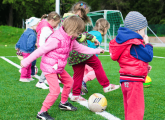With increasing numbers of children starting school lacking basic skills, it’s vital parents understand the importance of the early years, says Felicity Gillespie…
Eery parent wants the best for their children and to see them thrive. Which begs the question: why are a shockingly high number of pupils entering primary school ill-equipped for the learning journey ahead?
Teachers report that a third of children are starting Reception class unable to dress or feed themselves independently.
This lack of basic self-care skills means that every child in the classroom is losing out on an average of 2.4 hours a day of teaching time while schools struggle to play catch-up.
One in four children is not yet toilet-trained at age four. This is a stark contrast to the 1970s and 80s, when 83% of 18-month-olds were out of nappies.
The school-readiness crisis is arguably the most important equality issue in society. The science is unequivocal: the earliest months and years of life are immensely consequential to our later life chances.
The fastest rate of brain growth and the greatest impact on life chances happen before children turn two. Our brains double in size in the first year alone.
Research has even shown that a child’s development score at 22 months can accurately predict educational outcomes at 26 years.
Much of the attainment gap we see at age 16 can be traced to the time children start school. Poor vocabulary skills at age five, for instance, make adults four times more likely to have reading difficulties. It also makes them three times more likely to have mental health problems, and twice as likely to be unemployed.
Yet for every £1 invested in the early years, the Exchequer saves £13 in later-life state interventions. Conversely, our collective failure to intervene early costs us dearly – over £16 billion every year.
There is apparent confusion and ignorance about what a child starting Reception should be able to handle, and what parents should be doing to support their child’s early development.
Our research indicates that less than half (48%) of parents believe it’s completely their responsibility to ensure their children are toilet-trained.
Others are needlessly anxious if their child isn’t able to write the name or know all their letters when they start Reception – neither expectation is correct.
The science clearly indicates that for good bowel and bladder health, children should be out of nappies between 18 and 30 months. I didn’t know that – did you?
Further complicating matters is a significant misalignment in how school readiness is defined and measured at a policy level.
While parents and school governors generally understand “school ready” to mean the skills a child needs when they start Reception year, the new government target for 75% being school ready – part of the Best Start in Life strategy and the new Opportunity Mission – is assessed at the end of Reception.
These mixed-up measures of two different developmental points overlook the immense challenge faced by staff, who find themselves on the front lines of a crisis.
It is time to accept a fundamental truth: parents are the first and most important educators of children. The best nurseries cannot alone support children’s development without the engagement of informed parents, aided by knowledgeable and accessible services where needed.
Yet, many new mums and dads are struggling, increasingly isolated from crucial sources of advice. We’ve seen a 40% reduction in health visitors since 2015 and the closure of integrated services provision through Sure Start centres.
While some blame the impact of the cost-of-living crisis and the shadow of the pandemic, frustration among teachers is growing. More are telling us that the phrase “they are a Covid baby” has become an excuse.
Share these ideas for parents to try with their children…
The good news is that the early years sector has begun to address the lack of clarity of expectations with a collaborative effort.
A group of leading experts, education and care providers, and parenting groups have come together for the first time to produce a simple, single definition for parents, nursery settings, childminders and schools.
The Starting Reception website is a great starting point for a conversation, with links to a wealth of practical advice for parents and carers who might be struggling.
We need to find a way to openly discuss the importance of parenting without sounding like an interfering “nanny” state.
Nobody is suggesting that if a child is struggling, parents should beat themselves up or think they will be behind forever. Children can catch up; it just takes longer and costs more.
This isn’t about blaming or shaming; it’s about empowering parents and giving children the strongest possible start.
There’s ample opportunity available for parents to support their children’s development. Simple, everyday actions like putting down the phone to pick up a book and reading together, playing a game, or having a simple two-way “serve and return” conversation (think Wimbledon!).
And yes, getting those nappies off.
By working together, we can lay a strong foundation for every child’s future success, unlocking their potential and saving billions for the taxpayer. It’s time to move from ambition to action.
Felicity Gillespie is the director of Kindred2, a leading early years charity.

EYFS sports activities – Ideas to try at nursery
Editors picks

5 ways to celebrate World Book Day 2022
Editors picks

Mark making EYFS – How to prepare children
Editors picks
